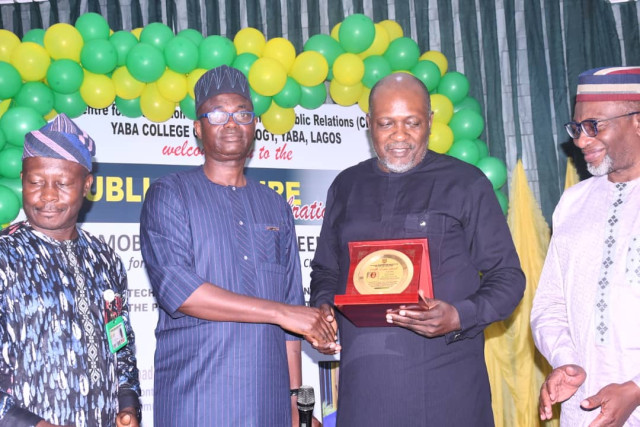The Rector of Yaba College of Technology, Dr. Ibraheem Abdul, and the Rector of the Federal Polytechnic, Ilaro, Dr. Mukail Akinde, emphasized the urgent necessity to incorporate Artificial Intelligence into Nigeria’s technical education framework to prepare students with relevant skills for the future and enhance national development.
During a public lecture titled “Technical Education and National Development: The Place of AI, Its Credibility, Trust, and Transparency,” held at the Yusuf Grillo Auditorium in Yaba College of Technology, Lagos, the rectors highlighted the transformative potential of AI and the critical need for its ethical application in education.
A statement from YabaTech on Sunday mentioned that the event was held in honor of Dr. Omobayo Taofeek Raheem, the former Director of the Centre for Information, Communication and Public Relations and Deputy Rector of Yaba College of Technology, recognizing his valuable contributions to the institution.
Dr. Abdul, who opened the event, described it as a pivotal discussion for redefining technical education in a rapidly changing technological landscape.
"The future of education, particularly technical education, is closely tied to technology, especially artificial intelligence," stated Dr. Abdul.
He noted that the proper integration of AI into educational systems could foster innovation, promote applied research, and prepare students to meet the challenges of a fast-evolving labor market.
He added, "This lecture is not solely about honoring a specific individual but also about considering how emerging technologies like AI can enhance the impact of technical education and address the skills gap."
Chairing the lecture, Akinde shared similar sentiments, asserting that technical education should progress beyond conventional methods to incorporate smart technologies.
"Artificial Intelligence has emerged as one of the most groundbreaking influences in contemporary development. Its inclusion in technical education improves training quality and readies students for high-demand positions in automation, data science, and robotics," he said, while also cautioning that the application of AI should abide by ethical standards to avoid misuse and bias. "The focus should not be on whether we utilize AI, but on the responsibility with which we implement it," Akinde emphasized.
He advocated for cooperative efforts among educators, developers, and policymakers to ensure that AI tools are developed and utilized with clarity and accountability.
He provided examples such as intelligent tutoring systems, virtual labs, automated assessment platforms, and AI-assisted coding tools, all capable of customizing learning experiences and enhancing student success.
Akinde further promoted the integration of AI ethics into curricula, aiming to equip students with not only technical skills but also the principles of responsible innovation.
The discussions underlined the consensus that Nigeria’s education system should keep pace with global advancements, leveraging AI to cultivate equitable, innovative, and skill-focused learning environments.
Ace broadcaster and Group Controller for Current and Public Affairs at TVC Communications Ltd, Mr. Babajide Kolade-Otitoju, during his lecture, expressed concern over the ongoing neglect of practical skills in Nigeria, despite the nation’s significant youth population and increasing skills gap.
His paper was titled, “Technical Education and National Development: The Place of AI, Its Credibility, Trust, and Transparency.” Kolade-Otitoju, represented by Mr. Dotun Oladipupo, Managing Editor and Chief Executive Officer of Premium Eagle Media, criticized Nigeria’s longstanding inclination towards academic certifications over practical skills. "In Nigeria, practical skills are not given the importance they deserve. We need to transition from valuing paper qualifications to recognizing practical proficiencies," he stressed.
He underscored the significance of technical education as a viable means of providing young individuals with the essential hands-on skills that the economy requires. "Technical education presents a credible alternative, equipping youth with the practical expertise essential for the economy," he elaborated.
He pointed out the importance of industry exposure, advocating for stronger collaborations between educational institutions and the private sector through internships, apprenticeships, and hands-on learning programs to address the unemployment issue while promoting innovation in engineering, manufacturing, and digital media sectors.
He also urged President Bola Ahmed Tinubu to endorse the bill that abolishes the longstanding divide between Higher National Diplomas and Bachelor’s degrees, emphasizing increased investment and support for Nigeria polytechnics.




















